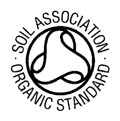Pioneering organic farmers to miss out under new
CAP payments
14/02/05
Hundreds of pioneering organic farmers, and
organic dairy farmers, will be massively disadvantaged as a result
of new CAP payments.
The Soil Association is warning that up to 200 longstanding organic
farmers and 600 organic dairy farmers, who have converted more
recently, will be affected. They will not receive the same level
of payments as other farmers and will be denied access to compensation.
The Soil Association - the UK's main promoter and certifier of
organic food and farming - is calling on Defra, SEERAD and the
Welsh Assembly to address this issue by releasing the money needed.
Long standing organic farmers CAP payments previously rewarded
farmers for keeping large numbers of dairy cattle, beef cattle
and sheep, or farming large areas of arable crops. In contrast,
organic farmers tend to have lower stocking densities and grow
a wider range of unsubsidised crops. The Soil Association estimates
that organic farmers typically received 40% less CAP money compared
with non-organic farmers
Because the new CAP payments (the Single Payment Scheme) are based
on the amount of subsidy received in the past, organic farmers
will receive less money under the new scheme.
To compensate some farmers who may be affected, hardship payments
are available from Defra, SEERAD and the Welsh Assembly. To qualify,
farmers must have been in an agri-environment scheme (such as the
Organic Aid Scheme or Countryside Stewardship) during1997- 2002.
They must also show that they have received less subsidies as a
result of meeting the requirements of their agri-environment scheme.
Defra states that farmers who decided to convert to organic production
before 1994 - when organic grant aid first became available - did
so purely as a "business decision", and are therefore
not entitled to claim hardship funds. The Soil Association estimates
that this affects up to 200 organic farmers.
Patrick Holden, Director of the Soil Association said,
"Defra's decision is grossly unfair. These farmers pioneered
sustainable agriculture and have provided environmental benefits
for over 10 years. They never benefited from public money to convert
to organic farming and now they will lose out yet again. Accommodating
these farmers would not involve significant sums of public money;
it is the principle that is important.
"The situation is particularly serious for organic farmers
in Wales (where I farm) and Scotland as there will be no move to
a more equitable, area-based payment over time as there will be
in England."
The Soil Association first raised concerns over these issues with
Defra in 2003, writing several letters as part of the consultation
on CAP reform. It is the only organic organisation lobbying for
change.
Remedies From 2005 to 2012, payments in England will gradually
switch from being based on historic subsidies to regional payments
based on the area of land farmed. This will bring equity to the
level of payments received by organic and non-organic farmers.
In the meantime the Soil Association says that longstanding organic
farmers in England should be paid the full regional payment level
immediately.
Wales and Scotland In Wales and Scotland payments will remain
at historic levels - no regional average payments will be introduced.
The Soil Association says that as affected farmers in Wales and
Scotland cannot receive hardship payments they should be given
access to the National Reserve (a pool of money held by Defra,
SEERAD and the Welsh Assembly) to bring their payments up to that
of their non-organic neighbours.
The Single Payment Scheme is calculated differently in Scotland,
Wales and England but initially all payments will relate to the
amount of subsidy received in the past.
Organic dairy farmers Organic and non-organic dairy producers
will receive a payment based on the amount of milk quota (the number
of litres each farmers is allowed to produce each year) held on
31 March 2005. Organic dairy farmers usually produce less milk
than non-organic dairy farmers because they may use dual purpose
breeds which give lower yields, rely on forage rather than concentrate
for feed, and have lower stocking densities.
The Soil Association is calling on Defra, SEERAD and the Welsh
Assembly to make payments to producers from the National Reserve.
In England, Defra also has the option of paying the full regional
average payment from the outset.
Information for farmers Hardship claims must be made by the end
of February. The Single Payment Scheme started in January 2005
but payments will be made between December 2005 and June 2006.
Claims under the National Reserve must be made in May 2005 as part
of the single payment scheme application.
The Soil Association's producer services department would like
to hear from organic farmers who may be affected. Call 0117 914
2400.
| 

 Soil Association
Soil Association